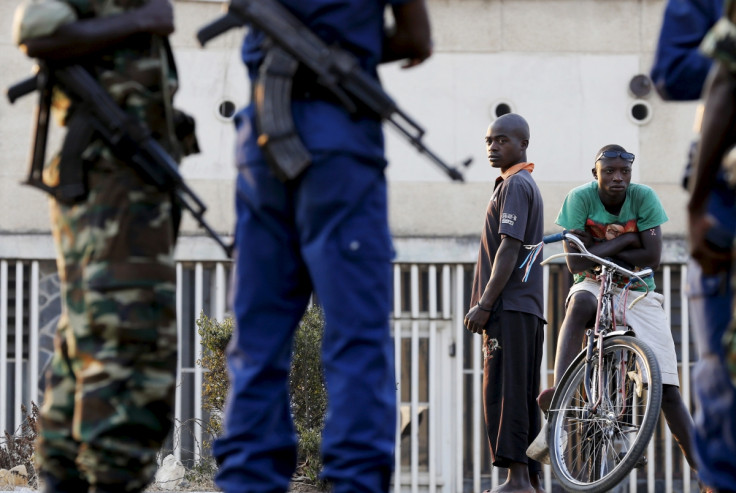Burundi: Bujumbura lockdown amid fear of war erupting after deadly attacks on army barracks

Live updates
10:32 GMT:
Local media report that a young boy has been hit by bullets allegedly fired by the API (support for the protection of institutions), the Presidential guard in Quartier 4 in Ngagara, north of Bujumbura. Reports describe how the young boy was hit by a bullet in the back just meters from his house.
In Ngagara's Quartier 6, at least one home was raided by armed forces, who claimed they were looking for "arms and fighters" who may have been hiding inside.
In the district's Quartier 7, local journalists have described how military officers ordered local residents, who were chatting outside their homes, to lie on the floor, before being interrogated.
A witness from Ngagara was quoted as saying: "We don't know if we'll survive the day, elements of the API are hidden in bushes here and there, on every street corner. They fire on everything that moves. We feel left to own own devices."
Original article
Burundi's capital was under lockdown after the government accused the opposition of being behind what it described as a "coup" after dozens were killed following coordinated assaults on two army barracks in the capital Bujumbura early Friday (11 December). The fighting was the heaviest since a failed coup on 13 May, precipitated by President Pierre Nkurunziza's bid for a third term in office, which he later won in contested elections in July.
Heavily armed men attacked army barracks at Ngagara in the north of the city, and the ISCAM Higher Institute of Military Training college in the southern district of Musaga, at around 4:00am (CAT). Heavy firing, including the sounds of artillery, lasted several hours. An officer told AFP "virtually all the attackers were killed in Ngagara base". The number of army casualties was still unknown at the time of writing.
I am in Nyakabiga, we are in the middle of a war, we are staying home and await the continuation, good or bad.
Bujumbura under lockdown
According to witnesses contacted by IBTimes UK, the capital is now under lockdown. "The city is closed, there are no cars and no schools are open. Only the army and the police are circulating, as if there was a curfew," a local journalist said from Bujumbura.
At 11:00am (CAT), exchanges of "sporadic" gunfire could still be heard in the district of Nyakabiga, a witness reported,but fighting seemed to have cooled off. A local resident from Nyakabiga confirmed the gunfire, telling IBTimes UK: "I am in Nyakabiga, we are in the middle of a war, we are staying home and await the continuation, good or bad. There is a lot of gunfire, [coming from] big automatic weapons, machine guns. The police and army are here, but we still can't determine what is happening."
Sources told IBTimes UK the government may soon declare a state of emergency.
Camps divided over attackers' identities
While the identities of the attackers were still unknown at the time of writing, the government accused opponents to Nkurunziza's third term of being behind the attacks, while independent media said the gunmen may have been aided by army officers siding with the opposition.
Presidential adviser Willy Nyamitwe, who confirmed the attacks on Twitter, blamed them on "Sindumuja" (I am not a slave), a term used for the opposition often described by the government as insurgents.
"The Sindumuja insurgency ended up with a failed coup. The shots in the night conclude with today's defeated attack. Long live Burundi," stated Nyamitwe, who claimed the situation was "returning to normal".
#Burundi : Situation is returning to normal as firearms are seized, many #Sindumuja assailants killed or arrested pic.twitter.com/uddDh7luUz
— Willy Nyamitwe (@willynyamitwe) December 11, 2015According to a local journalist who asked to remain anonymous, the army is now deeply divided, and a number of officers may have enabled the attacks. "It looks like the aim of last night's coordinated attack against military camps was to loot stocks of arms, and it seems to have worked," the journalist, said, pointing to "complicities" within the armed forces. "We know people inside the armed forced opened the doors (of the barracks)."
A local resident who supports the opposition, claimed the government would use the attacks to "go after" opposition members. "The government says they were civilians from the opposition or criminals who attacked the military barracks and stole the arms, but this is to enable [the authorities] to prosecute suspected opposition protesters, who will not be described as putschist killers," he told IBTimes UK.
© Copyright IBTimes 2025. All rights reserved.





















